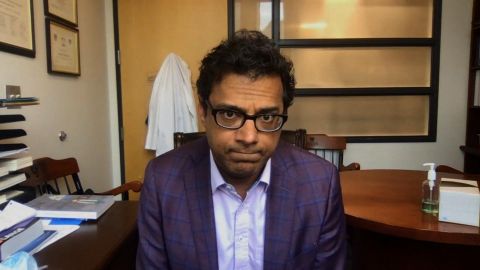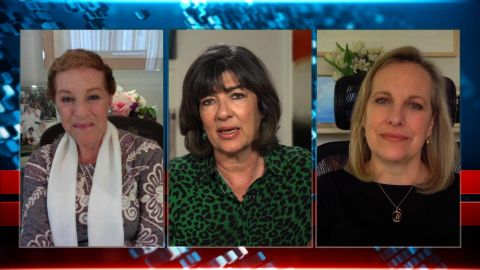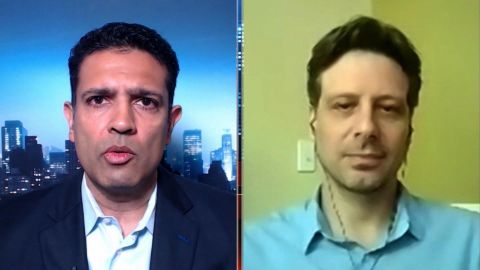Read Transcript EXPAND
CHRISTIANE AMANPOUR: And we are going to turn now to a country battling one of the worst coronavirus outbreak in Latin America. Bodies are dumped in the streets in Ecuador, as the health care system faces near collapse, and funeral homes struggle to cope. Guillaume Long was Ecuador’s foreign minister. He was also ambassador to the United Nations. He’s currently a senior analyst at the Center for Economic and Policy Research. And he’s speaking to our Hari Sreenivasan about Ecuador’s unfolding crisis and the challenges facing Latin America, as coronavirus grips that region.
(BEGIN VIDEOTAPE)
HARI SREENIVASAN: Thanks, Christiane. Guillaume, thanks for joining us. First, give us an update. Where is Ecuador in this pandemic now?
GUILLAUME LONG, FORMER ECUADORIAN FOREIGN MINISTER: Well, Ecuador, I think, is one of the worst cases of COVID-19 in Latin America. It has certainly the highest rate of infection per capita. And, obviously, it’s a smaller country in Latin America than other giants. So, in absolute terms, it has less amount of cases. But in relative terms, it is huge. And, in fact, even the Ecuadorian government is starting to recognize in indirect ways that, you know, its official figures are way under-reported. And we are probably talking five or six times more deaths from COVID-19 than the actual figures that have been reported. And the way to look at that into more detail is by looking at the average, average of the death toll, average that you would have normally had for these months, so essentially March and April, and comparing it with the national death toll that you’re having right now. And you’re having, you know, five, six times, even seven times more deaths than you would normally have in a normal year. So it’s a real tragedy. It’s been not just a sanitary crisis, but a mortuary crisis, because the system collapsed, and now a little bit more under control. But it’s a major tragedy, particularly in Guayaquil, the city Guayaquil in Ecuador, which was the epicenter over this phenomenon.
SREENIVASAN: The images that we saw several weeks ago from Guayaquil just so stunning to anybody on the planet that started to watch them. It seemed that there was such an intense fear that people had, even the funeral parlors had, of dealing with the bodies, where people were literally left on the side of the road.
LONG: This has to do with a number of factors. I think, certainly, the government was late implementing the right kind of measures. And there was a lot of flip-floppings. But then there are more kind of long-term factors as well. So, institutions have been collapsing over the last couple of years. There have been big major budget cuts in the health system, with — we don’t exactly know the exact number, but probably around 10,000 health workers laid off in the last couple of years, major cuts in the health budget. It’s actually been accompanied by an IMF structural adjustment program reform, so questions to be raised there, and then a general lack of leadership. And then, as you said, fear kicked in. Fear kicked in, particularly in the funeral parlors. A lot of them closed down, shut their doors, stop attending people with the deceased, the member — with deceased family members. And so this created this kind of snowball effect. The state didn’t intervene in these funeral parlors, didn’t act on time, and before long, you had people with bodies in their homes, and then bodies on the streets, and then bodies at the entrances of hospitals and malls, and so on and so forth. Eventually, the government created this task force to deal with this phenomenon, but it was too little too late. And, you know, hundreds of bodies were abandoned on the streets of Guayaquil, which is a terrible tragedy. And Guayaquil being a sort of southern tropical city, with often temperature in the high 90s or low 105 Fahrenheit, kind of 30, 40 degrees Celsius, it made the problem worse.
SREENIVASAN: The IMF has approved close to $650 million for Ecuador. How do you make sure that that money gets to the people who need it?
LONG: Yes, so the original plan of the IMF was over $4 billion. And over the last few months, Ecuador’s not been able to deliver the kinds of reforms that the IMF was asking for. You may recall there were huge, historic protests in October of last year against the IMF program. So the IMF program has been very unpopular in Ecuador. This meant that the Ecuadorian government wasn’t able to deliver the kind of reforms that the IMF was expecting. And so money has been slow trickling in to Ecuador. Now there’s this new offer of a few 100 million in order to deal with the crisis itself. But Ecuador is in a really awkward spot right now. It promised IMF reform. It hasn’t been able to deliver it. And it’s kind of been abandoned by the people, because it’s the most unpopular government since — probably since the democratization of Ecuador in 1979, with a government that probably has — and we will have to see what the latest figures are, but depending on the pollster, between 10 and 15 percent approval ratings, 7 percent credibility ratings. So, abandoned by the people from below, if you like, but also abandoned them from big capitals from above. So, lenders, the IMF, nobody really trusts this government anymore. And this is the worst-case scenario for a government facing this kind of — well, this pandemic and this crisis.
SREENIVASAN: Your economy, I think, had maybe 2.2 percent GDP growth last year. The IMF is expecting possibly a 6.3 percent drop this year. How does Ecuador get through this, with already such a weak economy, with essentially two months of decreased productivity?
LONG: Yes, I mean, it has to be extremely creative. It has to go for major non-cyclical policies. It’s got to free liquidity from the central bank. It’s got to break a few taboos, unfortunately. It hasn’t — it’s been late in paying state workers, public civil servants. But it’s been very quick at paying bondholders, right? And this is something that goes beyond Ecuador. There have been several calls from Latin America, from the region for a moratorium on debt repayment, for the issuance of SDR, special drawing rights. The IMF seems to be in favor of that. This would mean several billion for the region, $6 billion for Ecuador, probably $20 billion for Argentina. Without these things, it’s going to be a disaster in Ecuador and in Latin America at large.
SREENIVASAN: Let’s talk a little bit about the politics here too. I mean, former President Correa was recently convicted on bribery charges. He’s in Belgium. He denies these charges. But he’s also prohibited from coming back into the country. He’s going to be arrested if he returns. So, on top of a pandemic, you still have some political uncertainty here. What has to be done to try to move the country forward?
LONG: Yes. So, I think the main goal of the Moreno administration has been to try and avoid a Correa comeback, right? So they have done this through essentially the judicialization of politics and trying to nail him for what I would think most serious jurists have considered to be bogus charges. And they try to speed the process up, because September is the deadline for the presentation of candidacies for February 2021 elections. And if Correa manages to president its candidacy, he can’t run for the presidency, because Moreno has already managed to change the constitution barring him from doing that, but he could run for vice president, he could run for Congress. And if he manages to enroll for the February 2021 elections, then you’re going to have an emboldened political party, Correa’s political party, with him on the ticket somehow. And this is what Moreno wants to wants to avoid. So, before September, they have to make sure that he has a guilty verdict, which — beyond appeal, because right now Correa can still appeal. And that would definitely bar him from running. It would take away his political rights for 25 years. So, it’s a race against time. They are really speeding up the whole process. So, the judiciary in Ecuador is under lockdown right now because of COVID-19, and yet the Correa trial is going forward.
SREENIVASAN: I should point out for audience that you worked with the Correa administration. Do you feel any sense of responsibility for any of these long-term problems that Ecuador’s had that go past the administration that’s in power now?
LONG: I mean, sure. I mean, I’m — I feel that we made a great mistake in choosing current President Lenin Moreno as Correa’s successor, because, at the end of the day, he comes from our party. So, yes, there’s a great sense of responsibility there. But in terms of the policies themselves, it’s been a U-turn. It’s been a 180-degree U-turn. The health budget has been slashed. Everything we were kind of doing has been reversed. So, I don’t think we have that responsibility, per se. I mean, the new government came in, and they did what they thought they should do. And, unfortunately, it’s been pretty disastrous.
SREENIVASAN: Now, President Moreno in another departure from his predecessor, has tried to make nice with President Trump. He met him in Washington, is in talks with a trade deal. Is it working?
LONG: I don’t think it’s working, because President Trump has little to offer Ecuador right now. There’s been no significant increase in aid and cooperation.
SREENIVASAN: The administration will say, hey, we just sent down a bunch of ventilators. That was asked for.
LONG: Yes, I think that’s, you know, sort of very meager help, compared to what Ecuador was expecting from cozying up to President Trump, right? So, I don’t think this is really significant help. I think the United States is facing a difficult situation itself right now. And I think the Ecuadorian government could be asking for other things. For example, it could be asking for a suspension of deportation flights right now. There have been a number of deportation flights to Ecuador. But, sure, it would be risking the rest wrath of the Trump administration. Right now, I don’t think the United States is playing a key role in supporting Latin American countries through the pandemic. On the contrary, it’s actually exporting COVID-19 through these ICE air flights, more than 260 ICE air flights in the last three months or so, during a pandemic, with a lot of deported Latin Americans being infected with COVID-19, being deported back to their home countries, which is a terrible situation.
SREENIVASAN: So, has the United States deported COVID-positive people back to Ecuador?
LONG: Yes, so, in Ecuador, we don’t have any concrete information, because the government appears not to have been testing. The people who are deported, arrive in Ecuador don’t seem to have been tested. So we don’t really have information there. But we know that, elsewhere in Latin America, deportees coming from same detention centers where Ecuadorians have been held have tested positive. So, the best example is Guatemala, where deported Guatemalans have been testing — tested upon arrivals, up to 64 percent of them testing positive in two successive flights landing in Guatemala. That’s a huge amount of — Guatemalans are saying that up to 20 percent of Guatemalans infected with COVID-19 came from the United States as deportees, right? This is a huge amount. So there’s no reason to think that this is not the trend throughout Latin America. These detainees come from an ICE detention center across the United States, where we know, because there’s been also a number of samples that have been taken, there’s roughly a 50 percent ratio of these peoples that are in ICE detention centers infected with COVID-19, living in largely cramped — in close proximity with each other, in cramped conditions, which means that spread of the virus has been a big problem. It’s been large — it’s been widely reported in the United States there has been a big problem in ICE detention facilities.
SREENIVASAN: You were ambassador to the U.N. for a while. What does the funding, or lack thereof, from the U.S. do to an agency like the World Health Organization?
LONG: Yes, so it’s a terrible blow to the WHO. U.S. funding to the WHO is around $400 million a year. So, its — WHO budget is around $2 billion. So, $400 million is a huge amount. It’s a fifth of its overall budget. And it’s the worst time to do it, because if the WHO a role to play, it now that it has to play. So, certainly, I think it’s rather cynical on behalf of the Trump administration to be doing this right now, particularly saying the WHO was slow in responding, when even after the WHO had declared a public health emergency, the Trump administration was saying, this is not a big problem, when, actually, the Trump administration was still kind of engaging with this kind of negationist approach to the problem. And even after the WHO declared it as a pandemic, you saw the Trump administration trying to minimize the risk. So, I think it’s particularly ironic and particularly cynical on behalf of the Trump administration to attack WHO in these terms and to cut budget right now. And I think it’s fundamentally for domestic political gains. The Trump administration is going to use COVID-19 pandemic to attack foreign agents and try to make this a foreign problem, focusing on China and also on the WHO. I think this is campaign mode, and this is the only reason why it’s happening.
SREENIVASAN: Does the U.S. administration have a legitimate concern over those the WHO’s kind of soft-gloved approach to China, when it did matter early on?
LONG: Again, I think it could have — it could have more legitimate criticism of the WHO if the U.S. had actually heeded what the WHO said from the beginning, right? So it’s hard to say, you were too slow, when, when they actually did say something, the U.S. ignored it, right? So there’s a great deal of cynicism there. Now, there’s a debate as to whether WHO was too soft on China or not. I mean, we can have this debate. WHO is not a perfect organization. I know quite well. I was, as you said, an ambassador to the U.N. But, right now, the WHO is playing a crucial role, particularly in the developing world. For Latin America, the WHO role is very important, and it’s now that it needs the most amount of funding. If it needs to be reformed, let’s reform it. But if we want it to be more successful, we’re not going to need more — less funding — sorry — for the WHO. We’re going to need much more funding for the WHO, because $2 billion a year is really nothing, in the context of the kinds of threats that we’re seeing the WHO is going to be facing increasingly in the future.
SREENIVASAN: When you look across the region, does the pandemic threaten, I guess, democracies overall?
LONG: Yes, I think that’s a major risk. Last year was punctuated throughout the region by widespread protests against what I would call right-wing governments, but some of them have very right-wing governments, right, the Bolsonaro government, I would argue the Moreno government in Ecuador, the Anez government in Bolivia, and so on and so forth, Haiti, the Moise government. And there were a series of unprecedented protests in Latin America, certainly the biggest protests in my generation in Ecuador, huge protests in Chile that were ongoing for months. This was unprecedented in decades. And so a lot of these governments have felt threatened. And I think several of them have probably maximized the possibility, the opportunity that’s been afforded to them by the lockdown, the different types of states of emergency that have been decreed, the curfews. A number of countries have got curfews, right? In Ecuador, there has been a curfew from 2:00 p.m. onwards. Nobody can be out on the streets. And that certainly demobilizes people politically. You’re even seeing countries delaying elections. In the case of Ecuador, the elections are planned in February, but the government is already trying to say, well, maybe February is too soon. This is highly suspicious, right? So I think a number of governments are trying to maximize this crisis for political gains as well and cracking down on the opposition, certainly.
SREENIVASAN: Guillaume Long, thanks so much for joining us.
LONG: Thank you for having me on your show.
About This Episode EXPAND
Christiane speaks with Dr. Atul Gawande about the current COVID-19 statistics and Julie Andrews and Emma Walton Hamilton about their new podcast for children. Hari Sreenivasan speaks with former Foreign Minister of Ecuador Guillaume Long about the severe challenges facing Latin America.
LEARN MORE


